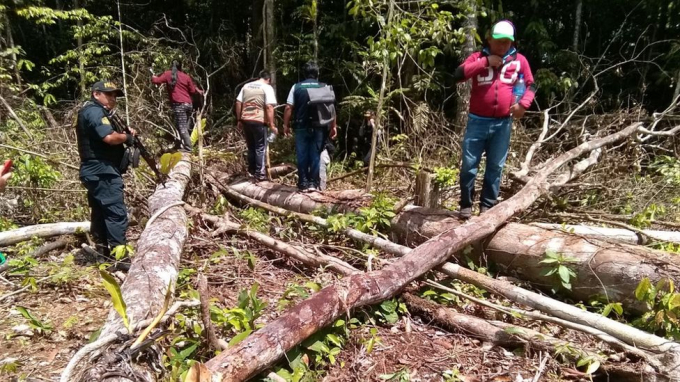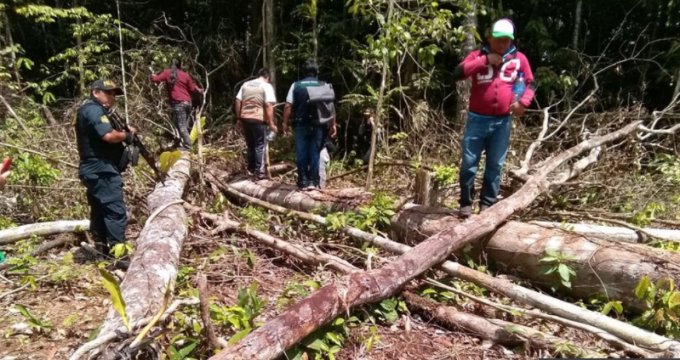November 25, 2025 | 04:24 GMT +7
November 25, 2025 | 04:24 GMT +7
Hotline: 0913.378.918
November 25, 2025 | 04:24 GMT +7
Hotline: 0913.378.918

Community leaders are joined by environmental enforcement agents to investigate an illegal rainforest clearing on their territory. Photo: BBC
Indigenous people living in the Peruvian Amazon were equipped by conservation groups with satellite data and smartphones.
They were able to reduce tree losses by half in the first year of the project.
Reductions were greater in communities facing threats from illegal gold mining, logging and drugs.
Over one-third of the Amazon rainforest lies within the territory of approximately 3,344 acknowledged indigenous communities.
But for decades, these areas have been under attack from outsiders who are determined to cut down trees for a range of purposes including mining, logging and the planting of illicit crops like the coca plants used to manufacture cocaine.
Over the past 40 years, governments and environmentalists have invested heavily in the use of satellite technology to monitor the removal of trees.
Governments in Brazil, Peru and Colombia have put in place a system of high-resolution deforestation alerts, but there is little evidence that this information reaches the indigenous communities most affected.
This new research set out to see if putting information directly into the hands of forest communities would make a difference.
In this randomised, controlled study, the authors identified 76 remote villages in the Peruvian Amazon, with 36 randomly-assigned to participate in this new monitoring programme.
Thirty-seven other communities served as a control group and continued with their existing forest management practices.
Three members of each selected community were trained in the use of technology and shown how to carry out patrols to verify deforestation.
When satellite information showed suspected deforestation activity in an area, photos and GPS coordinates were loaded onto USB drives and carried up the Amazon river and delivered by couriers.
The information was then downloaded onto specialised smartphone apps which would guide the community monitors to the suspected locations.
When the forest patrols confirmed any unauthorised deforestation, they would report back to a general assembly of community members to decide on the best approach.
In cases where drug dealers were involved, the community could decide to report the issue to law enforcement.
If the activity was perceived as less risky, community members could intervene directly and drive the offenders off their land.
When the researchers examined the impact of the new approach, they found that deforestation dropped by 52% in the first year, and by 21% in the second.
"It's quite a sizeable impact," said Jacob Kopas, an independent researcher and an author on the paper.
"We saw evidence of fewer instances of tree cover loss in the programme communities compared with control communities."
"On average, those communities managed to avert 8.8 hectares of deforestation within the first year. But the communities that were most threatened, the ones that had more deforestation in the past were the ones pulling more weight and were reducing deforestation more than in others."
Indigenous groups welcomed the research, saying it is among the first peer-reviewed studies to show the benefits of empowering local communities.
"The study provides evidence that supporting our communities with the latest technology and training can help reduce deforestation in our territories," said Jorge Perez Rubio, the president of the Loreto regional indigenous organization (ORPIO), where the study was carried out.
The scale of the problem of deforestation in indigenous areas is significant. Between 2000 and 2015, around 17% of tree loss in the Amazon occurred on nationally-protected or areas assigned to indigenous peoples.
This is expected to increase in the coming years.

Community leaders are joined by environmental enforcement agents to investigate an illegal rainforest clearing on their territory. Photo: BBC
"Over the next decade, if nothing changes, indigenous peoples in the Amazon Basin are projected to lose 4.4 million hectares of rainforest, mostly to outsiders who encroach on their territories to cut down trees," says Cameron Ellis, with the Rainforest Foundation US, who helped facilitate the study.
"But if the community-based forest monitoring methodology could be widely adopted and local governance strengthened, forest loss in the Amazon could be reduced by as much as 20% across all indigenous lands."
"If the approach were targeted to regions with high deforestation rates, forest loss in those areas could be cut by more than three quarters."
The study has been published in the journal Proceedings of the National Academy of Sciences (PNAS).
(BBC)

(VAN) Brazil's COP30 presidency pushed through a compromise climate deal on Saturday that would boost finance for poor nations coping with global warming but that omitted any mention of the fossil fuels driving it.

(VAN) Poultry farmers in the UK have been warned that they could face one of the worst winters yet for bird flu.

(VAN) Prices of main-crop paddy have risen sharply, with jasmine rice hitting 16,100 baht per tonne — the highest level in years.

(VAN) In Brazil, FAO unveiled a series of reports and initiatives showing how sustainable agrifood systems are a solution to the climate crisis.

(VAN) With names like neodymium and dysprosium, rare-earth elements sound exotic — and their perceived scarcity has only added to the mystique.

(VAN) In a new study published in Trends in Biotechnology, researchers used a gene-editing technology called CRISPR to increase a fungus's production efficiency and cut its production-related environmental impact by as much as 61%- all without adding any foreign DNA.

(VAN) A top official in Beijing’s Cop delegation says China is committed to clean energy – but US’s absence is a problem.